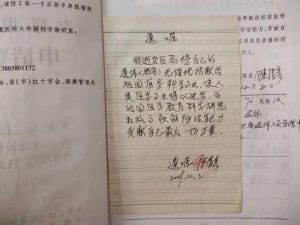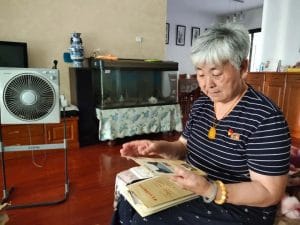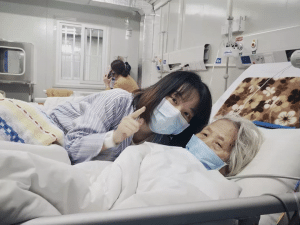In Hefei Telecommunications new village, 38 elderly residents have registered to donate their organs after they die. Among them, the eldest donor is 93 and the youngest is 50. Many among the group have expressed frustration that people do not understand their decision.
They have tried to raise awareness of what they are doing by encouraging others to donate their bodies after death, making sure that people also know they can simply donate certain organs if they don’t want to donate their whole body. The group tries to persuade people by telling them how others can benefit from a donation: “One person’s cornea could very well save three to four blind people in need.”
“Why would people talk about their remains when they’re still alive?” some would jokingly ask. Others would bring up more serious reservations. “When people are dead, your soul still remains. How can you allow people to cut you up like that?” But gradually over time, more and more elderly people have been persuaded that donating their bodies is a noble thing to do. Their reasons for donation range from wanting to make a positive impact even after death, to helping those in need.
“If we choose to donate, no one will suffer anymore.”
Twelve years ago, 63-year-old Zhu Xiufang decided to sign a consent form to donate the bodies of her and her husband Chen Qingxiu after they die in order to aid research into Alzheimer’s disease, which Zhu’s husband suffers from. However, the couple’s two daughters were unwilling to accept their decision. As a family, they fought and cried for two days straight and tried to get their mother to donate just a single organ, but Zhu stood firm. After her daughters signed the family consent form for their parents, Zhu wanted to ensure that they wouldn’t change their minds — so she and her husband wrote letters outlining their last wishes and included them with the application form. “When I die, I am willing to donate all of my remains in an attempt to advance medical research. I want to contribute to better treatment and research in my country,” she said.

It was 2007 when Chen Qingxiu, Zhu’s husband, first started to suffer the symptoms of Alzheimer’s disease. The first symptom was memory loss, which became worse and worse over time. Next, his temper started to turn volatile and he would sometimes throw objects across the room. As the disease progressed, he started to require personal care, until finally, he was brought to a hospital where he lay unconscious in bed, saliva dripping down the corners of his mouth.
Zhu consulted numerous medical papers and bought stacks of thick medical books – only to discover that the cause of Alzheimer’s is still unknown and that there is currently no effective treatment. One book mentioned that through conducting autopsies scientists have managed to discover that many sufferers have a soluble aggregate of Abeta in their brains. This struck Zhu hard. She said: “Studying the anatomy of remains can help medical research on diseases that have not yet been overcome.” This was the moment when she first started to consider donating her own body to science.
She continued with her research and started to wonder how exactly a body was dissected after death. Zhu began to understand that her husband’s body, if it was donated after his death, could really aid research into Alzheimer’s. She decided to ask her husband, promising she would also donate her own body to science. Chen Qingxiu simply stared into her eyes and nodded, before saying yes.
For the next seven years, Zhu digested all of her complex emotions alone as she watched her husband gradually slip away in his hospital bed. But the idea of donating their bodies to science and helping others kept her going.

Zhu’s husband has now been dead for many years, but she is still unsure if her daughters have forgiven her for signing the donation forms. She did not ask what research her husband’s remains were used for or whether his organs saved lives or not. “I don’t want to ask too many questions. What’s donated is donated.” But she firmly believes that “there will always be someone in the world that lives on because of him.”
“This was your grandma’s wish before she died”
During the early morning of March 6, 2020, Xia Yanwen passed away in the intensive care unit of China’s Huoshenshan Hospital, becoming the first patient with Covid-19 to volunteer to donate her remains. Due to the inadequate procedures for donating the remains of patients with infectiousness diseases at that time, Xia’s granddaughter Wu Shangzhe wrote a voluntary donation statement, saying that “the hand holding the pen kept shaking.”
“This was your grandma’s wish before she died,” said Wu’s mother comforting her. She said that early on, her grandparents had read reports about human organ donation in the newspaper and had secretly gone to the hospital to register. They had long since decided to donate their organs after death.

Shen Weixing, vice president of the Chinese Society of Health Law and dean of Tsinghua University Law School, said that in routine donations, one person’s organs can save several patient’s lives. In addition, during times like the pandemic, scientific research done on patients can save countless lives.
Professor Liu Liang, director of the Department of Forensic Medicine at Tongji Medical School of Hua Zhong University of Science and Technology, said: “The doctors are at war with this virus. If bodies of infected patients aren’t dissected, it means that the prisoner that is this virus may never be caught. We will essentially be fighting blind.” In reality though, many families of donors are still reluctant and skeptical about body donations.
After the donation of the body of her grandmother, Wu Shangzhe received plenty of supportive messages on the social media platform Weibo, but she also received private messages accusing her of donating the body for fame.
Cai Yaqing had a similar experience. After the death of her father Cai Derun, she donated his body to Huoshanshen Hospital for medical research. The reaction from some of her relatives proved extremely hostile, with some accusing her of “selling” her father’s body and others saying she had disrespected him. Some members of the family even cut off contact with her and her mother.
Traditional Chinese beliefs, such as the reincarnation of the soul after death, make it difficult for many Chinese to accept that the body will be damaged after death due to organ removal or dissection. As a result, body donations are uncommon. But attitudes are slowly changing and donations are on the increase.
“My mother is a hero”
According to statistics from the China Human Organ Donation Management Center, last year saw the number of registered Chinese organ donors surpass one million for the first time. This represents a dramatic increase, considering that the figure is the same as the number of donations for the previous eight years put together. As of April this year, the cumulative number of registered organ donors exceeded 3.15 million. This has successfully saved the lives of nearly 100,000 patients with organ failure.
But despite this, according to statistics from the National Health and Family Planning Commission, there are about 300,000 people on the waiting list for transplants in China at any one time. Only 10,000 of those actually get the opportunity to receive a donated organ, with around one organ available for every three people on the waiting list. There are also few bodies available for medical research.
Chen Jingyu, deputy dean of the National People’s Congress and Wuxi People’s Hospital affiliated with Nanjing Medical University, said that although the number of organ donations in China is the second largest in the world in absolute terms, the relative value is still low. The donation rate is only four to five organs per million people — far lower than in Europe and the United States.
But in recent years, China’s human organ and body donation system has improved. According to the “National Human Organ Distribution and Sharing Core Policy” published by the National Health Commission, all donated organs are distributed through the China Human Organ Distribution and Sharing Computer System. The system eliminates the need for human intervention and relies solely on a person’s medical condition as the criteria for matching donors with recipients, helping to ensure transparency, fairness, and traceability.
With social attitudes changing, more and more are now willing to consider donating their bodies after death. Wu Shangzhe has now volunteered to donate her entire body to science after she dies. She said that she is also seeing more and more people choosing to do the same thing, with people occasionally reaching out to her, inspired by her grandmother’s story and keen to donate their own organs. When Wu’s mother received a thank you letter from Wuhan Huoshanshen Hospital, she was ecstatic. “Like a child, it almost gave me spiritual comfort. Like it was telling me that my mother was a hero,” she said proudly.



